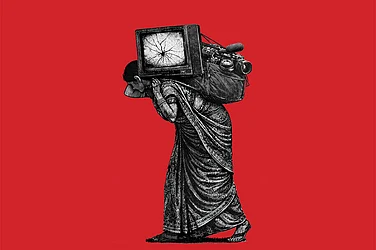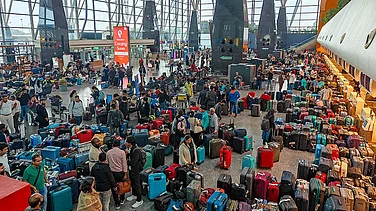On yet another occasion of its opposition to same-sex marriages, the Centre on Sunday questioned the maintainability of pleas seeking legal recognition of same-sex marriages in the Supreme Court. A five-judge constitutional bench of the apex court on Tuesday, April 18, is set to start hearing the clutch of petitions seeking legal recognition of same-sex marriages.
In the same submission, the Centre said the petitions represent "urban elite" views. Earlier, the Centre said in court that same-sex marriages would "create havoc" in society.
Earlier on January 6, the Supreme Court transferred to itself various petitions seeking recognition of same-sex marriages in different high courts. The petitions filed so far seek recognition under Hindu Marriage Act (HMA), Special Marriage Act (SMA), and Foreign Marriage Act (FMA).
Though homosexuality was decriminalised in 2018, same-sex marriages continue to be unacknowledged and unrecognised by Indian laws. Both the Government of India and the ruling Bharatiya Janata Party (BJP) have opposed any recognition of same-sex marriages.
What did the Centre tell Supreme Court?
Terming the petitions seeking legal validation of same-sex marriage as one which reflects an "urban elitist" view, the Centre has told the Supreme Court that recognition of marriage is essentially a legislative function which the courts should refrain from deciding.
Questioning the maintainability of the petitions, the Centre said what is presented before this court is a mere urban elitist view for the purpose of social acceptance.
"The competent legislature will have to take into account broader views and voice of all rural, semi-rural and urban population, views of religious denominations keeping in mind personal laws as well as and customs governing the field of marriage together with its inevitable cascading effects on several other statutes," the Centre said.
The submissions were made in an affidavit filed in response to a batch of pleas seeking legal validation of same-sex marriage.
The affidavit stated that marriage is a socio-legal institution which can be created, recognised, conferred with legal sanctity and regulated only by the competent legislature by way of an Act under Article 246 of the Constitution of India.
"It is submitted that therefore, it is the humble request of the applicant the issues raised in the present petition be left to the wisdom of the elected representatives of the people who alone shall be the democratically viable and legitimate source through which any change in the understanding and/or the creation/recognition of any new social institution can take place," the Centre said.
What do PILs on same-sex marriage recognition say?
A number of petitions were filed in recent years in various high courts for the legal recognition of same-sex marriages. Gender rights campaigners believe recognising same-sex marriages is the next logical step after the decriminalisation of homosexuality.
Since personal affairs such as marriage and divorce are governed by laws specific to communities in India, the recognition of same-sex marriages has also been sought under community-specific laws, most notably under the Hindu Marriage Act (HMA). The HMA also applies to Buddhists, Sikhs, Jains, and all the sects of Hinduism.
One of the earliest petitions was filed in 2020 in the Delhi High Court by Abhijit Iyer-Mitra. He argues that the HMA does not distinguish between heterosexual and homosexual marriages in its wording. To drive this point, he argues that HMA requires "any two Hindus" for marriage, according to a copy of the petition accessed by Outlook.
While listing the conditions for marriage, HMA’s Section 5 says, "A marriage may be solemnised between any two Hindus…."
Other petitions have also sought recognition under Special Marriage Act (SMA), which is a secular law. The reasoning is similar to the one in Iyer-Mitra’s petition regarding the Hindu Marriage Act — the gender-neutral wording. Legal experts highlight that SMA is more liberal than HMA with its wording.
Listing the conditions related to solemnising marriages under SMA, the law’s Section 4 says "a marriage between any two persons may be solemnised under this Act (emphasis added)" and does not mention ‘husband’ or ‘wife’ in its sub-section containing the conditions.
Listing the age eligibility, SMA’s Section 4 (c), says, "The male has completed the age of twenty-one years and the female the age of eighteen years." However, the sub-section does not explicitly indicate that this eligibility is for a male to marry a female, and it is argued that this can be read as a gender-neutral provision.
What did Centre say earlier?
Earlier, both the Centre and BJP have opposed the recognition of same-sex marriages.
The BJP-led Union government has repeatedly challenged any recognition of same-sex marriages, saying that it's not legitimised and recognising it would create havoc in Indian society.
In February 2021, the Centre said marriage is only between a man and a woman and that interference in current marriage laws "would cause havoc" in society, according to India Today. The Centre further said that same-sex marriage cannot be a fundamental right.
"Despite the decriminalisation of Section 377 of the Indian Penal Code (IPC), the Petitioners cannot claim a fundamental right for same-sex marriage...[Decriminalisation of homosexuality] applies to aspects which would be covered within the personal private domain of individuals [akin to the right to privacy] and cannot include the public right in the nature of recognition of same-sex marriage and thereby legitimizing a particular human conduct," said the Centre, as per India Today.
In December 2022, BJP leader Sushil Modi termed the campaign for same-sex marriage recognition a "left-liberal" ploy to change "ethos of India". He also questioned the role of the Judiciary in the matter.
"Two judges can't decide on such an important social issue, which warrants a debate in Parliament and in society at large. Some left-liberals and activists are making efforts to change the ethos of the country. I urge the government to strongly argue against same-sex marriage in court," said Modi at the time.
In February, the Centre in an affidavit in the Supreme Court said that while same-sex unions or non-heterosexual marriages are not unlawful, there is no recognition either and there is no legitimacy despite the decriminalisation of homosexuality in 2018.
The Centre also said the fundamental right to life and liberty cannot include any implicit approval of same-sex marriage.
The Centre added that following a Supreme Court verdict in 2018, the only change is that persons of the same sex can engage in consensual sexual intercourse without being held criminally liable under Section 377 of the Indian Penal Code.
Referring to the 2018 verdict, the government said that the dictum of it does not extend the right to privacy to include a fundamental right in the nature of a right to marry by two individuals of the same gender in contravention of prevailing statutory laws.
It said the observations in the 2018 verdict cannot be treated as conferring a fundamental right of being recognised in marriage under Indian personal laws whether codified or otherwise.
(With PTI inputs)






















